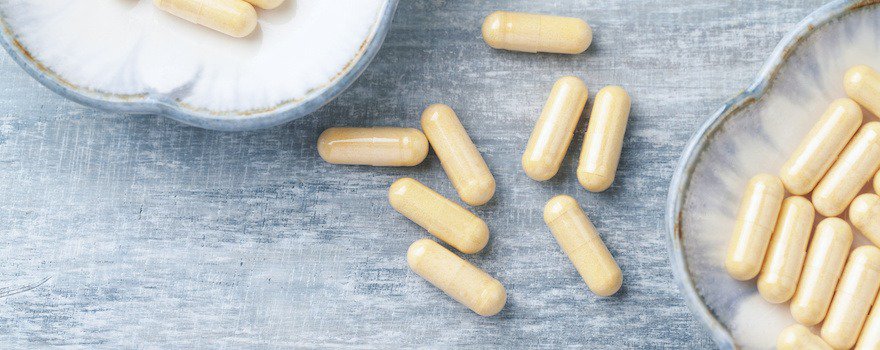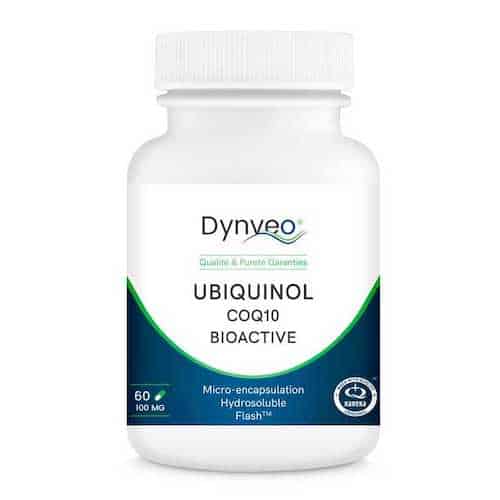We analyzed 9 products sold online and selected the coenzyme Q10 from Dynveo laboratory.
Our Selection Criteria
- Dosage: amount of active ingredient in a daily dose recommended by the brand. We recommend between 100 and 300 mg per day.
- Bioavailability: bioavailability depends on the body’s absorption of the active ingredient. This depends particularly on the form of the dietary supplement.
- Origin: can be synthetic or natural.
- Price / day: this is the daily price of the cure at the daily dose recommended by the brand.
- Customer Reviews: these customer reviews on the product are collected from the brand’s website or Amazon.
- Our Opinion on the Brand: following tests of dietary supplement brands we conduct each month.
OUR CHOICE
Brand: Dynveo
Dosage: 200 mg
Bioavailability: high
Origin: natural
Price / day: €1.57
Customer Reviews : 4.8/5 (avis-verifies.com)
The coenzyme Q10 supplement from Dynveo laboratory is, in our opinion, the best on the market.
Of superior quality, the coenzyme Q10 is present here in its bio-active form: ubiquinol. It comes from bio-fermentation rather than chemical synthesis like many other similar supplements.
It is protected from oxidation and is highly absorbable by the body thanks to a natural micro-encapsulation technology.
The ubiquinol used by the laboratory is 100% pure and patented by the Japanese company Kaneka™.
Dynveo is a dietary supplement laboratory known for its expertise and product dosages. We have tested and approved its after-sales service, which is responsive and relevant (read our full test here to learn more).
What are the benefits of coenzyme Q10?
Energy Production
With age, our body’s energy performance decreases, and fatigue takes over.
Cardiovascular, respiratory, and physical activities deteriorate. The body becomes more sensitive to oxidative stress, which causes premature aging.
Coenzyme Q10 (or ubiquinone) is an antioxidant, meaning it protects our body from damage caused by free radicals (oxidative stress).
It is found throughout the body, particularly in the mitochondria, the small energy factories within our cells. It is essential for energy production.
Thus, several studies indicate that coenzyme Q10 supplementation helps relieve fatigue present in certain conditions such as fibromyalgia.
Moreover, data suggest that coenzyme Q10 has beneficial effects on muscle energy production, thus improving athletic performance in patients suffering from lung disorders after 8 weeks of supplementation.
Anti-Aging Action
As confirmed by this review, the bioenergetic and antioxidant properties of coenzyme Q10 play a significant role in preventing the onset of diseases associated with aging in the body.
The effects of supplementation are the subject of much research. One study suggests that coenzyme Q10 could be a complementary treatment for the main causes of death worldwide (diabetes, hypertension, cancer, heart, and neurological diseases).
According to this study from the journal Frontiers in Physiology, coenzyme Q10 supplementation could help combat the progression of degenerative diseases such as Parkinson’s or Huntington’s disease, delaying cognitive decline and improving quality of life. Further studies are needed to confirm this hypothesis.
In the cosmetic field, its usefulness is also well known in anti-aging care.
Indeed, from the age of 25, the level of coenzyme Q10 tends to decrease throughout the body, particularly in the skin, leading to the appearance of the first wrinkles.
Skincare products concentrated in coenzyme Q10 have, in addition to their antioxidant properties, an interesting moisturizing effect.
Anti-Inflammatory Action
Several studies have proven the anti-inflammatory effects of coenzyme Q10. Supplementation over a period ranging from one week to four months has led to a significant reduction in cytokine production. These molecules stimulate the body’s overall inflammation.
Similarly, an experimental trial has shown that the production of pro-inflammatory substances in patients with chronic inflammatory diseases (rheumatoid arthritis) is significantly reduced after supplementation.
Finally, a randomized analysis (a protocol in which a treatment is compared to a placebo) demonstrates that a 40-day administration of Coenzyme Q10 relieves chronic pain and anxiety, and reduces inflammation in patients suffering from fibromyalgia.
It is also effective as a complementary treatment for migraines, thanks to its anti-inflammatory and antioxidant properties.
Indeed, mitochondrial dysfunction and oxidative stress are among the many causes that may be responsible for migraines. A meta-analysis reports that using Coenzyme Q10 as a therapeutic agent is beneficial for reducing the duration and frequency of migraines.
Cardiovascular Action

A deficiency in coenzyme Q10 is observed in patients with heart failure.
A study confirmed that supplementation with coenzyme Q10 contributes to better heart function.
Another study shows it reduces the risk of recurrences and sequelae of myocardial infarction.
Finally, it promotes a balanced blood pressure. A meta-analysis shows that taking it reduces blood pressure, with no notable adverse effects.
What are the food sources of coenzyme Q10?
External intake of coenzyme Q10 can be ensured by oils, notably canola oil, and by meats (pork, beef, and chicken).
Fatty fish (trout, sardines, herring) and nuts (peanuts, pistachios) also contain it.
In lower concentrations, it is also found in broccoli, an antioxidant food par excellence. But also in cauliflower, raspberries, oranges, eggs, and soy.
In what form should it be chosen?
In soft capsules
Regardless of the form of coenzyme Q10 used, this compound is liposoluble. It is therefore better absorbed when taken with a fatty food.
This is why laboratories generally offer it in the form of a soft capsule, which contains the active substance mixed with oils or fatty acids.
The body assimilates it optimally this way, as confirmed by this study.
In capsules
Capsules contain coenzyme Q10 powder. This form is not the best absorbable, but still adequate. It has the advantage of containing fewer preservatives and chemical agents than other forms.
In liquid form
The liquid form is composed of microparticles containing coenzyme Q10. This form is more expensive and its effectiveness is superior, when the dietary supplement is of quality!
The stability of the product depends on the manufacturing process used by the laboratory.
What criteria should be considered?
1. Different forms of coenzyme Q10
The production of coenzyme Q10 decreases with age and its absorption remains low at the intestinal level, which is why the chosen form is important.
It is present in three oxidation states: the reduced form, called ubiquinol, the oxidized form called ubiquinone, and an intermediate form not used in therapy: the ubisemiquinone form.
Ubiquinol and ubiquinone forms are found in the dietary supplement market.
In humans, although 90% of Coenzyme Q10 is found in its reduced ubiquinol form, both forms are biologically active.
Studies seem to show that ubiquinol is more effective than ubiquinone in certain processes, particularly in energy production and cell growth.
The bioavailability of ubiquinol is higher, and it stays longer in the body than ubiquinone. Therefore, it is the most active form and should be preferred.
Another form called liposomal form has been developed, with production using nanotechnology. This type of coenzyme Q10 withstands digestive enzymes, allowing for better absorption.
However, few studies exist on the safety of these compounds, so I advise you to choose quality laboratories if you opt for a liposomal form.

2. Manufacturing Method
It is extracted in different ways. Either through a fermentation of cane sugar or beets, using yeast strains, or by bacterial fermentation, or through a chemical process.
The natural process allows obtaining a biologically active coenzyme Q10, which is the form most found in dietary supplements.
The synthetic process involves chemical agents, and coenzyme Q10 is generally derived from tobacco waste derivatives. It is cheaper to produce, but its assimilation is not optimal.
You will find the manufacturing methods on the back of the boxes or on the laboratory’s website. If there is no specific information, contact the laboratory or move on!
3. Product Purity
During the manufacturing process of a dietary supplement, the addition of substances affects absorption.
Many dietary supplements contain preservatives and additives (notably soft capsules) to stabilize the mixture between coenzyme Q10 powder and oils.
A study reports a reduction in its absorption with the addition of other antioxidants (such as vitamin C) in the composition of the dietary supplement.
Capsules generally contain fewer excipients; however, I advise you to always check the ingredient list on the back of the box.
Although manufacturing by a natural fermentation process does not involve chemical substances, coenzyme Q10 is not yet organically certified.
4. Dosage of Coenzyme Q10
The recommended dosage varies between 100 to 300 mg per day: check whether you get the minimum of this daily dose with the dietary supplement.
For a cardiovascular indication, the daily dose should be a maximum of 200 mg, and to reduce fatigue or optimize performance, the dose can go up to 300 mg.
For other pathologies, the intake can go up to 1200 mg with the doctor’s approval.
In case of diabetes, regularly check your blood sugar level during coenzyme Q10 supplementation, as this molecule can improve blood sugar levels.
To summarize
To ensure you choose a quality coenzyme Q10, check:
- The form: choose ubiquinol, the most active form ;
- The manufacturing method: prefer a natural manufacturing process (fermentation) ;
- The purity of the product: check the ingredient list;
- The dosage: It varies between 100 and 300 mg/day depending on the indications
OUR CHOICE
Brand: Dynveo
Dosage: 200 mg
Bioavailability: high
Origin: natural
Price / day: €1.57
Customer Reviews : 4.8/5 (avis-verifies.com)




